The HI98165 is a rugged, waterproof, portable Foodcare pH meter that measures pH and temperature using the specialized FC2423 cheese pH electrode. This professional, waterproof meter complies with IP67 standards. The HI98165 is supplied with all necessary accessories to perform a pH/temperature measurement packaged into a durable thermoformed carrying case that holds the meters, probes and calibration buffers securely in place.
pH is an essential measurement throughout the entire cheesemaking process. From the initial measurements of incoming milk to the final measurements of ripened cheese, pH is the most important parameter for cheese quality and safety control.
Acidification of milk begins with the addition of bacterial culture and rennet. The bacteria consume lactose and create lactic acid as a byproduct of fermentation. The lactic acid produced will cause the pH of the milk to go down. Once the milk reaches a particular pH, the rennet is added. The enzymes in rennet help to speed up curdling and create a firmer substance. For cheesemakers that dilute their rennet, the pH of the dilution water is also critical; water that is near pH 7 or higher can deactivate the rennet, causing problems with coagulation.
Once the curds are cut, stirred, and cooked, the liquid whey must be drained. The pH of whey at draining directly affects the composition and texture of the final cheese product. Whey that has a relatively high pH contributes to higher levels of calcium and phosphate and results in a stronger curd. Typical pH levels at draining can vary depending on the type of cheese; for example, Swiss cheese is drained between pH 6.3 and 6.5 while Cheddar cheese is drained between pH 6.0 and 6.2.
During brining, the cheese soaks up salt from the brine solution and loses excess moisture. The pH of the brine solution should be close to the pH of the cheese, ensuring equilibrium of ions like calcium and hydrogen. If there is an imbalance during brining, the final product can have rind defects, discoloration, a weakened texture, and a shorter shelf life.
Cheeses must fall within a narrow pH range to provide an optimal environment for microbial and enzymatic processes that occur during ripening. Bacterial cultures used in ripening are responsible for familiar characteristics such as the holes in Swiss cheese, the white mold on Brie rinds, and the aroma of Limburger cheese. A deviation from the ideal pH is not only detrimental to the ecology of the bacteria, but also to the cheese structure. Higher pH levels can result in cheeses that are more elastic while lower pH levels can cause brittleness.
Cheese products can provide a number of challenges for the person that needs to measure pH. Cheese products tend to be solid to semi-solids. Both types of samples will coat the sensitive glass membrane surface and/or clog the reference junction. The FC2423 that is supplied with the HI98165 is designed specifically for measuring pH in cheese. From a conic tip shape in a durable 5 mm diameter stainless steel body for easy penetration into cheese without leaving a large hole to an open junction that resist clogging; the FC2423 is an ideal general-purpose pH electrode for cheese. The FC2423 connects to the HI98165 with a quick-connect, waterproof DIN connector, allowing for a secure, non-threaded attachment.
The HI99165 uses the stainless steel FC2423 amplified pH electrode. This specialized electrode offers numerous features that improve pH testing for cheese producers. The robust stainless steel sheath paired with the conical sensing tip allows for penetration in cheese at various points throughout the production process. An integrated temperature sensor also ensures that all pH measurements are compensated for temperature without the need for a separate temperature probe.
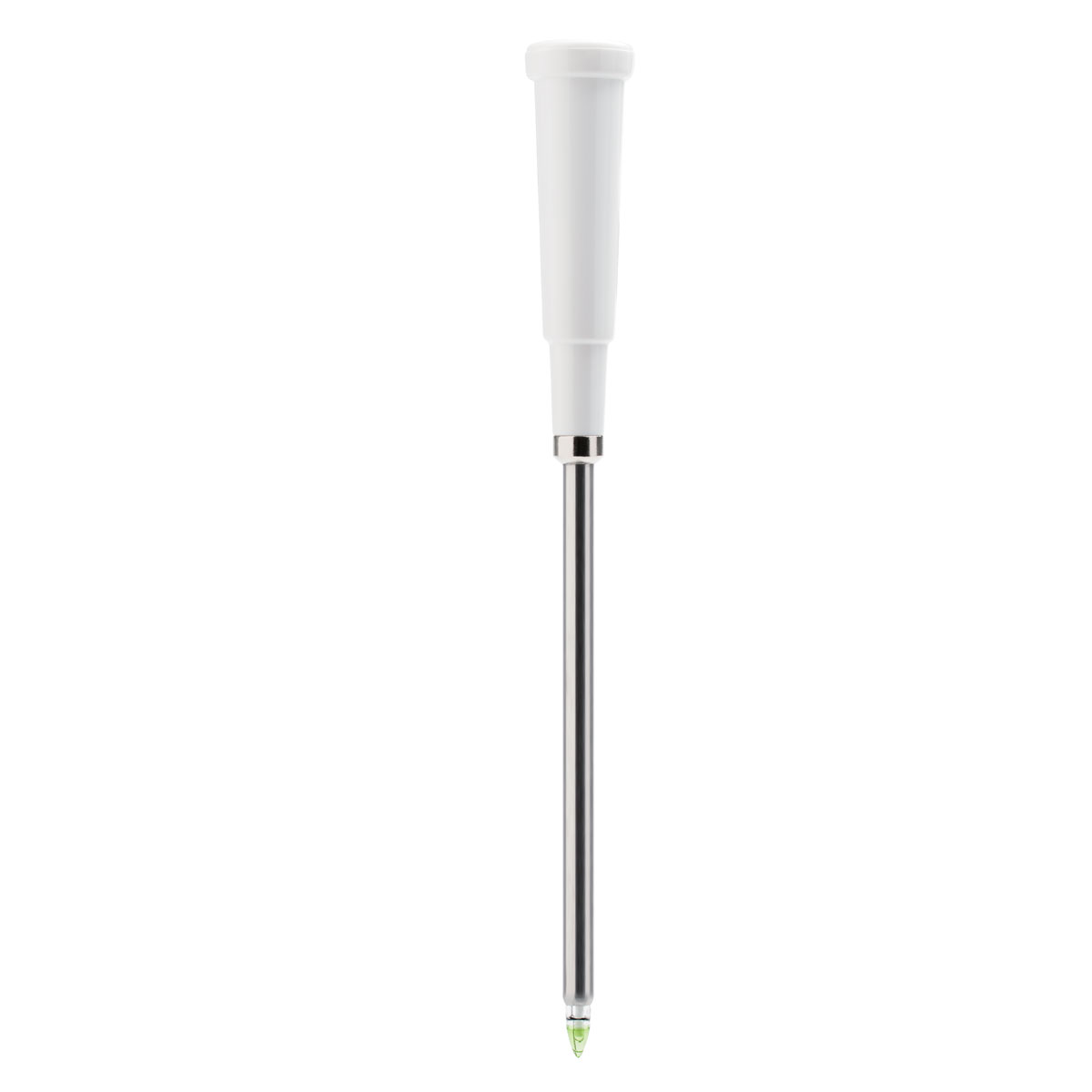
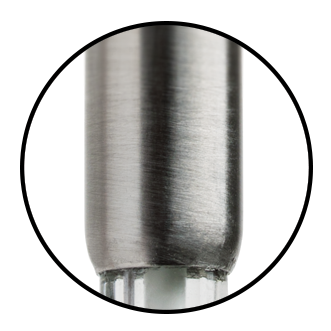
The AISI 316 stainless steel body offers durability in the production facility and can withstand chloride concentrations that cause corrosion in other types of alloys.
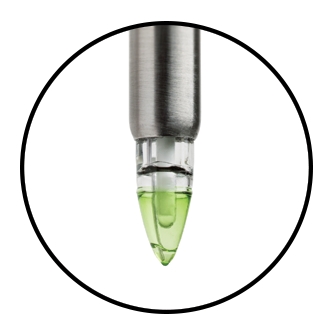
The conical shaped tip design allows for penetration into solids, semi-solids, and emulsions for the direct measurement of pH in samples such as cheese.
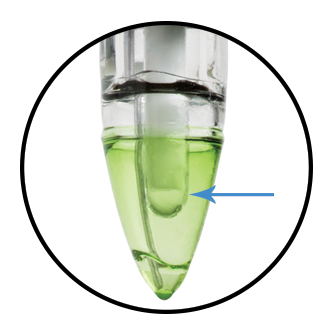
Errors in calibration and measurement are eliminated with the Automatic Temperature Compensation provided by the integrated temperature sensor.
Besides being supplied with a unique pH electrode made for cheese, the HI98165 has the Hanna's unique CAL Check™ feature that alerts the user to potential problems during the calibration process. This is a very important for the food processor since it is likely that the probe will be coated with the solids found in the food product being measured. This coating can easily lead to errors in pH measurement. By comparing previous calibration data to the current calibration, the meter will inform the user, with display prompts, when the probe needs to be cleaned, replaced, or if the pH buffer might be contaminated. After calibration, the overall probe condition is displayed on screen as a percentage from 0 to 100% in increments of 10%. The probe condition is affected by both the offset and slope characteristics of the pH electrode, both of which can be found in the GLP data.
Pressing the “AutoHold” virtual key in measurement mode, the meter will freeze and automatically log a stable reading. An “out of calibration range” warning can be enabled that will alert the user when a reading is not within the bracket of calibrated pH values.
The log-on-demand mode allows the user to record and save up to 200 samples. The logged data, along with the associated GLP data, can then be recalled or transferred to a PC with Hanna’s HI920015 micro USB cable and HI92000 software for traceability in record keeping for specific product batches. GLP data includes date, time, calibration buffers, offset, and slope, and is directly accessible by pressing the dedicated GLP key.
A contextual help menu based on the screen that is currently being viewed can be accessed at any time by the press of a dedicated button.
The high contrast, graphic LCD screen is easy to view outdoors in bright sunlight as well as in low-lit areas with the backlight. A combination of dedicated and virtual keys allows for easy, intuitive meter operation in a choice of languages.
The compact, durable HI720165 carrying case is thermoformed to hold all necessary components for taking a field measurement, including the meter and electrode, beakers, buffer solutions and cleaning solutions.
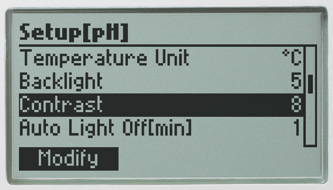
Setup screen
Our extensive setup screen features a host of configurable options such as time, date, temperature units and language for help screens and guides.
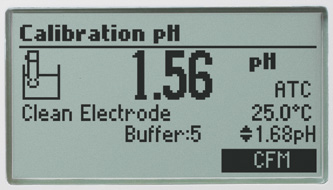
Calibration
pH calibration features detailed CAL Check™ messages. Users are guided through the calibration procedure with step-by-step on-screen instructions.
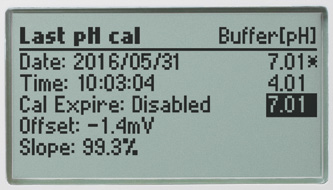
GLP
Comprehensive GLP functions are directly accessible by pressing the GLP key. Calibration data, including: date, time, offset, slope and buffers used in the last calibration can be reviewed.
Ergonomic, rugged, waterproof (IP67) design
Supplied with FC2423 Foodcare pH/Temperature electrode
Five-point pH calibration with seven standard buffers and five custom buffers
CAL Check
Log-on-demand
AutoHold
GLP Features
Calibration timeout to alert the user at a defined interval when the calibration has expired
Multiple language selection
200 hour battery life with battery level displayed on measurement screen
Menu driven for ease of use with virtual-key extended functionality
Contextual help at the press of a button
Backlit, graphic LCD
Connectivity
| SKU | HI98165 |
|---|---|
| Product Name | Professional Portable Cheese pH Meter - HI98165 |
| Quote Required | Yes |
| pH Range | -2.0 to 20.0 pH; -2.00 to 20.00 pH; -2.000 to 20.000 pH |
| pH Resolution | 0.1 pH; 0.01 pH; 0.001 pH |
| pH Accuracy | ±0.1; ±0.002 pH |
| pH Calibration | up to five point calibration, seven standard buffers available (1.68, 4.01, 6.86, 7.01, 9.18, 10.01, 12.45) + five custom buffers |
| pH Temperature Compensation | manual or automatic from -20.0 to 120.0°C (-4.0 to 248.0°F) |
| pH Input impedence | 10¹² Ohms |
| mV Range | ±2000 mV |
| mV Resolution | 0.1 mV |
| mV Accuracy | ±0.2 mV |
| Temperature Range | -20.0 to 120.0°C (-4.0 to 248.0°F) |
| Temperature Resolution | 0.1°C (0.1°F) |
| Temperature Accuracy | ±0.4°C (±0.8°F) (excluding probe error) |
| Temperature Calibration | manual or automatic from -20.0 to 120.0°C (-4.0 to 248.0°F) |
| pH Electrode | FC2423 Foodcare stainless steel body, pH electrode with internal temperature sensor, quick connect DIN connector and 1 m (3.3’ cable) |
| Logging Memory | 200 samples (100 pH and 100 mV range) |
| Connectivity | opto-isolated USB with optional HI 92000 software and micro USB cable |
| Automatic Shut-Off | user selectable |
| GLP | Yes |
| Battery Type/Life | 1.5V AA batteries (4) / approximately 200 hours of continuous use without backlight (50 hours with backlight) |
| IP Protection | IP67 |
| Environment | 0 to 50°C (32 to 122°F); RH 100% |
| Dimensions | 185 x 93 x 35.2 mm (7.3 x 3.6 x 1.4”) |
| Weight | 400 g (14.2 oz.) |
| Ordering Information | HI98165 is supplied with FC2423 PVDF body pH electrode, HI7004M pH 4.01 buffer solution (230 mL), HI7007M pH 7.01 buffer solution (230 mL), HI700642 electrode cleaning solution for cheese residues sachet (2), 100 mL plastic beaker (2), 1.5V AA batteries (4), HI92000 PC software, HI920015 micro USB cable, instruction manual with quick start guide, instrument quality certificate and HI720165 hard carrying case. |
 Malaysia
Malaysia